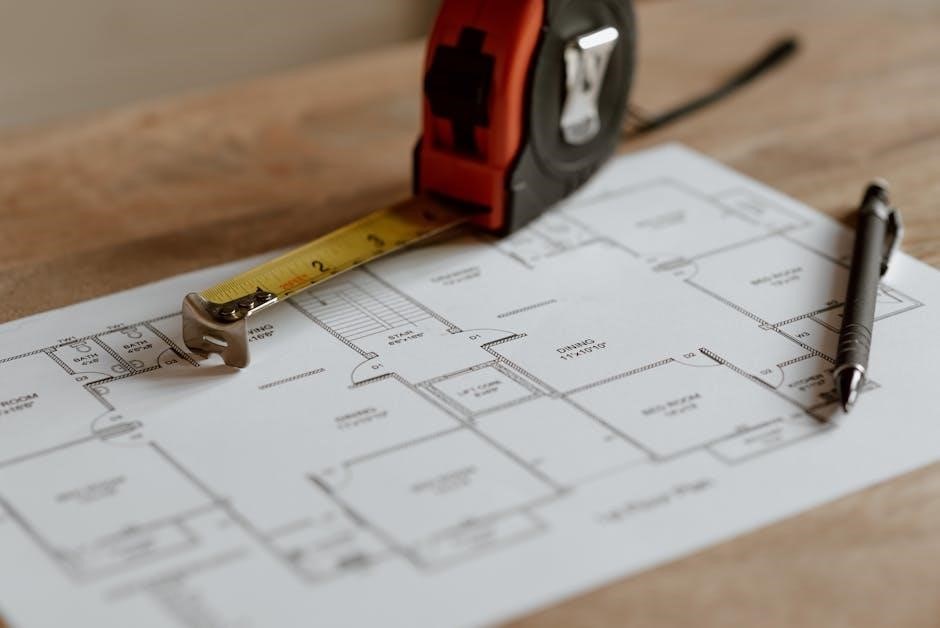Nevada’s construction industry is thriving, driven by urbanization and large-scale projects. Legal compliance ensures adherence to state-specific regulations, safeguarding businesses and projects from potential disputes and penalties.
1.1 Overview of the Construction Industry in Nevada
Nevada’s construction industry is a significant contributor to the state’s economy, with growth driven by urban development, infrastructure projects, and renewable energy initiatives. The sector encompasses residential, commercial, and industrial construction, with Las Vegas and Reno serving as key hubs. The industry is also influenced by tourism and mining activities, which create demand for specialized construction services. Sustainability practices and green building standards are increasingly prominent, aligning with Nevada’s focus on environmental stewardship and modern infrastructure development.
1.2 Importance of Legal Compliance in Construction
Legal compliance is paramount in Nevada’s construction industry to avoid penalties, disputes, and project delays. Adhering to state and federal regulations ensures safety standards, environmental protection, and fair labor practices. Non-compliance can result in fines, legal action, and damage to a company’s reputation. Proper licensing, permitting, and contract adherence are critical to maintaining operational integrity. Compliance also fosters trust with clients and stakeholders, ensuring smooth project execution and long-term business success in Nevada’s competitive construction market.

Licensing and Registration Requirements
Nevada requires construction businesses to obtain proper licenses and registrations through the NSCB. Compliance ensures legal operation, avoids penalties, and protects businesses and project integrity.
2.1 Nevada State Contractors Board (NSCB) Requirements
The Nevada State Contractors Board (NSCB) mandates specific licensing requirements for contractors. To operate legally, contractors must classify their licenses appropriately, submit applications with required fees, and provide bonds or insurance. They must also pass necessary exams and meet experience criteria. The NSCB ensures compliance with state laws, protecting consumers and maintaining industry standards. Failure to meet these requirements can result in penalties, fines, or business closure. Proper licensing is essential for legal operation in Nevada’s construction sector.
2.2 Specialty Licenses and Certifications
In Nevada, specialty licenses and certifications are crucial for contractors to demonstrate expertise in specific construction areas. These include electrical, plumbing, and HVAC licenses, each requiring separate applications and exams.Certifications like OSHA safety training and LEED accreditation enhance credibility and compliance with industry standards. The Nevada State Contractors Board (NSCB) oversees these requirements, ensuring contractors meet state regulations and ethical practices. Obtaining these licenses and certifications is vital for legal operation and building trust with clients in Nevada’s competitive construction market.

Contract Law and Agreements
Nevada construction projects rely on legally binding contracts to outline roles, responsibilities, and payment terms. These agreements ensure compliance with state laws and protect all parties involved.
3.1 Types of Construction Contracts
In Nevada, construction contracts are categorized into various types to suit project needs. Common types include Lump Sum Contracts, where a fixed price is agreed upon, and Cost-Plus Contracts, which reimburse actual costs plus a fee. Time and Material Contracts charge based on labor hours and materials used. Unit Price Contracts are used for projects with repetitive tasks, while Design-Build Contracts combine design and construction services. Each type is legally binding and tailored to specific project requirements.
3.2 Key Clauses in Construction Agreements
Construction agreements in Nevada must include essential clauses to ensure clarity and protection for all parties. Payment terms outline schedules and methods, while project timelines set deadlines and penalties for delays. Scope of work defines responsibilities, and warranty clauses specify post-completion obligations. Liability clauses allocate risk, and change order provisions govern modifications. Dispute resolution methods, such as arbitration, are often included. Insurance requirements and compliance with Nevada laws are also critical. These clauses ensure legal stability and project success.
Labor Laws and Employment Regulations
Nevada labor laws require adherence to minimum wage, overtime, and safe workplace standards. Employers must maintain accurate records and comply with anti-discrimination and harassment regulations.
4.1 Wage and Hour Laws in Nevada
Nevada’s wage and hour laws outline minimum wage requirements, overtime pay, and mandatory record-keeping. Employers must pay at least $10.50 per hour for employees without health benefits and $9.75 with benefits. Overtime pay applies after 40 hours per week, calculated at 1.5 times the regular rate. Accurate records of hours worked and wages paid are essential. These laws ensure fair compensation and protect workers from exploitation, applying to all industries, including construction.
4.2 Workers’ Compensation Requirements
Nevada requires employers to provide workers’ compensation insurance to cover work-related injuries or illnesses. This ensures medical care, wage replacement, and rehabilitation for injured employees. Most businesses with employees must comply, though exceptions exist for certain small businesses or independent contractors. Penalties for non-compliance include fines and potential criminal charges. Construction businesses, with inherent safety risks, must strictly adhere to these regulations to protect both employees and their operations. Coverage is typically obtained through the state fund or self-insurance for eligible employers.

Environmental and Safety Regulations
Nevada’s construction industry must adhere to strict environmental and safety regulations, ensuring compliance with state-specific environmental laws and OSHA standards to promote sustainable practices and safety.
5.1 Nevada Environmental Protection Laws
Nevada’s environmental protection laws regulate construction practices to minimize ecological impact. These laws enforce strict standards for air and water quality, waste management, and hazardous material disposal. Contractors must obtain necessary permits and comply with federal and state regulations, ensuring projects align with environmental sustainability goals. Non-compliance can result in penalties and project delays, making adherence crucial for legal and operational efficiency in Nevada’s construction sector.
5.2 OSHA Standards for Construction Sites
OSHA standards are critical for ensuring safety on Nevada construction sites. These regulations mandate strict safety protocols, including fall protection measures, hazard communication, and proper use of personal protective equipment. Employers must provide regular safety training and maintain accurate records of incidents. Compliance with OSHA standards is essential to prevent workplace injuries, fatalities, and legal penalties. Non-compliance can result in significant fines and reputational damage, emphasizing the importance of adhering to these guidelines in Nevada’s construction industry.
Insurance and Liability Coverage
Construction businesses in Nevada must secure adequate insurance, including general liability and professional liability coverage, to protect against third-party claims and errors in professional services.
6.1 General Liability Insurance
General liability insurance is essential for Nevada construction businesses, providing coverage for third-party claims involving bodily injury, property damage, or advertising injury. It covers legal fees, settlements, and medical expenses, protecting businesses from financial loss due to accidents or negligence. This insurance is often required for contractors and subcontractors to ensure compliance with project requirements. Having adequate general liability insurance is crucial for mitigating risks in the high-risk construction industry, safeguarding assets, and maintaining business continuity.
6.2 Professional Liability Insurance
Professional liability insurance protects Nevada construction professionals against claims of negligence, errors, or omissions in their work. It covers legal defense costs and potential settlements arising from faulty designs, improper project management, or failure to meet standards. This insurance is crucial for architects, engineers, and contractors, as it safeguards against financial losses due to professional mistakes. Having adequate coverage ensures compliance with industry standards and protects reputations in the competitive Nevada construction market.
Permitting and Zoning Laws
Nevada’s permitting and zoning laws ensure compliance with local ordinances, regulating land use and construction activities. These regulations promote orderly development and public safety across the state.
7.1 Local Permitting Processes
In Nevada, local permitting processes involve submitting detailed applications to city or county authorities. These applications must include project plans, zoning compliance, and environmental impact assessments. The review process ensures adherence to local building codes and ordinances. Inspections are conducted to verify compliance at various construction stages. Obtaining the necessary permits is crucial to avoid legal issues and ensure public safety. Each jurisdiction may have specific requirements, so thorough preparation and understanding of local regulations are essential for a smooth approval process.
7.2 Zoning Regulations for Construction Projects
Zoning regulations in Nevada govern land use and construction activities, ensuring projects align with local development plans. These laws dictate permitted uses for properties, such as residential, commercial, or industrial designations. Builders must comply with zoning ordinances, including height restrictions, setbacks, and parking requirements. Non-compliance can result in project delays or legal action. Understanding and adhering to these regulations is crucial for obtaining approvals and ensuring projects meet community standards and safety expectations. Proper planning and consultation with local authorities are essential for compliance.

Dispute Resolution and Litigation
Construction disputes in Nevada are often resolved through mediation, arbitration, or litigation. Legal processes ensure fair resolution of conflicts, protecting contractors and clients’ rights and interests effectively.
8.1 Mediation and Arbitration in Construction Disputes
Mediation and arbitration are common methods for resolving construction disputes in Nevada. Mediation involves a neutral third party facilitating negotiations, while arbitration uses a decision-making process. Both options are cost-effective alternatives to litigation, helping to preserve business relationships. Arbitration can be binding or non-binding, depending on the agreement. Nevada’s legal framework supports these dispute resolution methods, ensuring fair and efficient outcomes for contractors and clients alike. Proper documentation is key to a smooth process.
8.2 Litigation Process for Construction-Related Issues
The litigation process for construction-related issues in Nevada involves a formal legal process to resolve disputes. It typically begins with filing a lawsuit in court, followed by pre-trial motions and discovery. Evidence is presented during trials, and a judge or jury decides the outcome. Construction litigation often addresses breaches of contract, payment disputes, or defective work. Nevada’s court system ensures adherence to legal standards, providing a structured framework for resolving complex construction conflicts efficiently and fairly.
